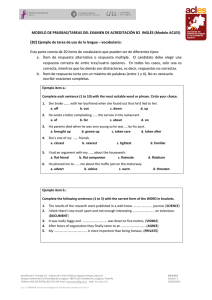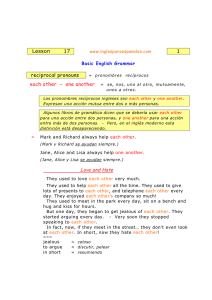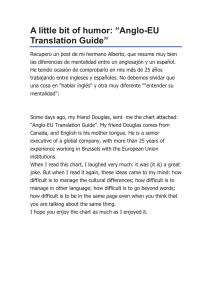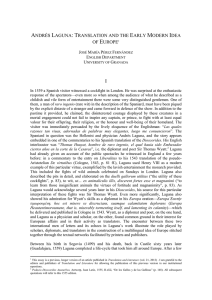Modelo de examen B1 - Fundación Empresa Universidad de La
Anuncio
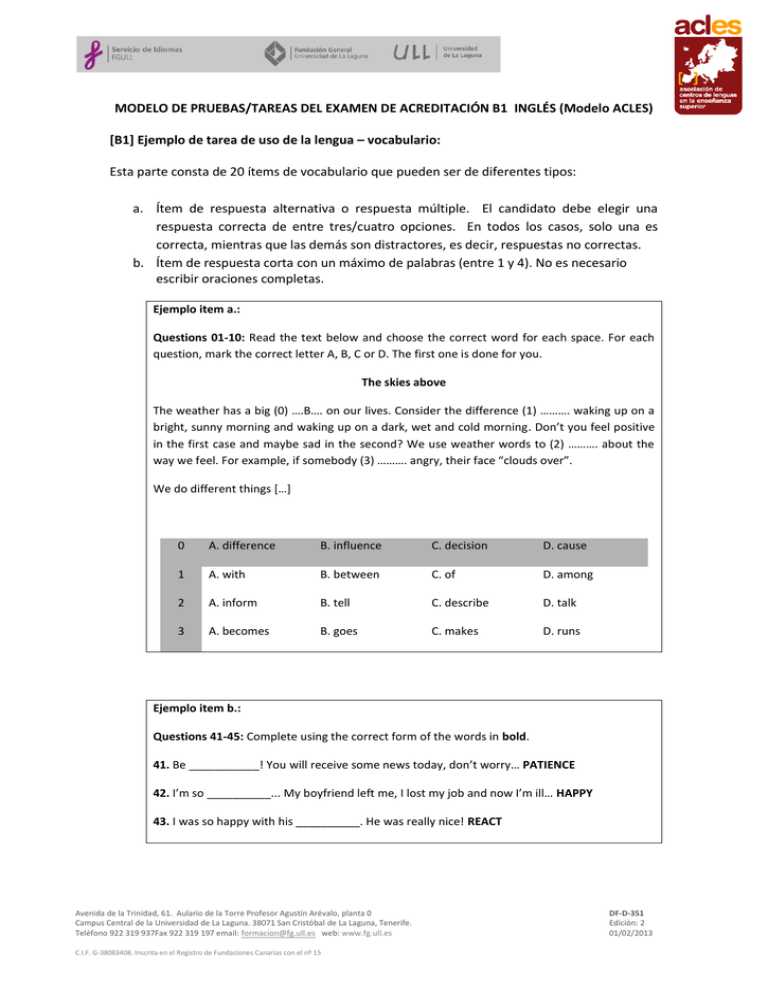
MODELO DE PRUEBAS/TAREAS DEL EXAMEN DE ACREDITACIÓN B1 INGLÉS (Modelo ACLES) [B1] Ejemplo de tarea de uso de la lengua – vocabulario: Esta parte consta de 20 ítems de vocabulario que pueden ser de diferentes tipos: a. Ítem de respuesta alternativa o respuesta múltiple. El candidato debe elegir una respuesta correcta de entre tres/cuatro opciones. En todos los casos, solo una es correcta, mientras que las demás son distractores, es decir, respuestas no correctas. b. Ítem de respuesta corta con un máximo de palabras (entre 1 y 4). No es necesario escribir oraciones completas. Ejemplo item a.: Questions 01-10: Read the text below and choose the correct word for each space. For each question, mark the correct letter A, B, C or D. The first one is done for you. The skies above The weather has a big (0) ….B…. on our lives. Consider the difference (1) ………. waking up on a bright, sunny morning and waking up on a dark, wet and cold morning. Don’t you feel positive in the first case and maybe sad in the second? We use weather words to (2) ………. about the way we feel. For example, if somebody (3) ………. angry, their face “clouds over”. We do different things […] 0 A. difference B. influence C. decision D. cause 1 A. with B. between C. of D. among 2 A. inform B. tell C. describe D. talk 3 A. becomes B. goes C. makes D. runs Ejemplo item b.: Questions 41-45: Complete using the correct form of the words in bold. 41. Be ___________! You will receive some news today, don’t worry… PATIENCE 42. I’m so __________... My boyfriend left me, I lost my job and now I’m ill… HAPPY 43. I was so happy with his __________. He was really nice! REACT Avenida de la Trinidad, 61. Aulario de la Torre Profesor Agustín Arévalo, planta 0 Campus Central de la Universidad de La Laguna. 38071 San Cristóbal de La Laguna, Tenerife. Teléfono 922 319 937Fax 922 319 197 email: formacion@fg.ull.es web: www.fg.ull.es C.I.F. G-38083408. Inscrita en el Registro de Fundaciones Canarias con el nº 15 DF-D-351 Edición: 2 01/02/2013 [B1] Ejemplo de tarea de uso de la lengua – gramática: Esta parte consta de 20 ítems de gramática que pueden ser de diferentes tipos: a. Ítem de respuesta alternativa o respuesta múltiple. El candidato debe elegir una respuesta correcta de entre tres/cuatro opciones. En todos los casos, solo una es correcta, mientras que las demás son distractores, es decir, respuestas no correctas. b. Ítem de respuesta corta con un máximo de palabras (entre 1 y 4). Las contracciones cuentan como una palabra, por ejemplo isn’t. La respuesta se considera incorrecta si excede del número de palabras especificado en las instrucciones del ejercicio. No es necesario escribir oraciones completas. Ejemplo ítem a.: Questions 21-30: Circle the correct answer (A, B or C). 21. You aren’t going to the party, _____? a. you are b. are you c. aren’t you 22. Could you tell me what _____? a. is your phone number b. your phone number is c. your phone number b. she would pay. c. she pays. 23. “I’ll pay”, she said. Anna said that ____. a. she will pay. Ejemplo ítem b.: Questions 11-15: Complete the second sentence so that it has the same meaning as the first one. Use no more than three words. 11. They know they won’t get better if they don’t practise. They know they won’t get better ____________________ they practise. 12. James can ski well. James is ____________________ skiing. 13. Entrance at weekends is more expensive than on weekdays. Entrance on weekdays is ____________________ than at weekends. Avenida de la Trinidad, 61. Aulario de la Torre Profesor Agustín Arévalo, planta 0 Campus Central de la Universidad de La Laguna. 38071 San Cristóbal de La Laguna, Tenerife. Teléfono 922 319 937Fax 922 319 197 email: formacion@fg.ull.es web: www.fg.ull.es C.I.F. G-38083408. Inscrita en el Registro de Fundaciones Canarias con el nº 15 DF-D-351 Edición: 2 01/02/2013 [B1] Ejemplo de tarea de comprensión lectora: Esta parte consta de dos tareas: una que contiene una serie de textos cortos, entre 5 y 6, (anuncios publicitarios, cartelera, mensajes personales y avisos, opiniones, noticias breves) de entre 60 y 100 palabras cada uno, sumando un mínimo de 500 palabras en total; una segunda tarea basada en un texto de mayor extensión (narrativo, descriptivo, de opinión, informativo, etc.) de entre 400 y 450 palabras. Habrá entre 10 y 20 ítems en total. Los ítems pueden ser de diferentes tipos: a. Ítem de respuesta alternativa o respuesta múltiple. El candidato debe elegir una respuesta correcta entre tres o cuatro opciones. En todos los casos, sólo una es correcta, mientras que las demás son distractores, es decir, respuestas no correctas. b. Ítem de respuesta verdadera o falsa. El candidato debe elegir si el contenido de la frase propuesta se corresponde o no con el texto. c. Ítem de reintegración de un fragmento a un texto. El candidato debe insertar en su ubicación original una palabra o un fragmento de texto que previamente se ha extraído del mismo. Puede haber fragmentos que no corresponden al texto y actúan como distractores. d. Ítem de ordenamiento. El candidato debe ordenar los párrafos de un texto o poner en orden cronológico los acontecimientos de un texto. Ejemplo ítem a.: READING 1 Read the text in each question. What does it say? Mark the correct letter A, B, C or D. 1. Do you feel anxious when you can’t update your Facebook profile, read your emails or tweet? If so, you may be suffering from FOMO. A new survey says that 56% of people suffer from FOMO when they stay away from social networks. The term has recently entered the Oxford English dictionary. It stands for ‘fear of missing out’. The dictionary definition is “anxiety that an exciting or interesting event may currently be happening elsewhere, often aroused by posts seen on a social media website”. 27% of those who participated in the survey admitted that checking their social media feeds is the first thing they do when they wake up. Which is the best definition of FOMO according to the text? A B C D worrying that if you are not at a party or event you are missing something great compulsive checking for status updates and messages on social networks for fear of missing an opportunity. the fear that you may lose your smartphone feeling sad because you have not been invited to an exciting party or event Avenida de la Trinidad, 61. Aulario de la Torre Profesor Agustín Arévalo, planta 0 Campus Central de la Universidad de La Laguna. 38071 San Cristóbal de La Laguna, Tenerife. Teléfono 922 319 937Fax 922 319 197 email: formacion@fg.ull.es web: www.fg.ull.es C.I.F. G-38083408. Inscrita en el Registro de Fundaciones Canarias con el nº 15 DF-D-351 Edición: 2 01/02/2013 2. How many mobile phones have you had in your life and what do you do with the old, broken ones? Most people throw them away. In fact, digital waste is a growing problem for society. Dutch designer Dave Hakken has come up with an amazing idea to reduce such waste. The Phoneblocks concept is a mobile phone made up of little blocks that can be replaced when they stop working. This means that you can keep your phone forever and just replace the broken parts. You can also build the ideal phone for your personal needs. The designer is trying to spread the word about his idea. His goal is to find 50,000 supporters so that the mobile phone industry will take notice. What is Phoneblocks? A B C D a new system to recycle mobiles phones a new kind of smartphone a new idea to build mobile phones that last longer a new mobile phone that never breaks Ejemplo ítem b.: READING 2 Look at the sentences below about working on a children’s summer camp. Read the text and decide if each sentence (1 to 10) is correct or incorrect. If it’s correct, mark T; if it’s not correct, mark F. Justify your answer according to the text. Summer jobs in children’s camps Camp America is an organization that runs over 12,000 children’s summer camps in the USA. All the camps are in the countryside and some are in areas of outstanding natural beauty. Different types of camps are available. While some are designed mainly for sports activities, others are suitable for children with different interests. Accommodation is provided at the majority of camps but some children attend during the day and return home in the evening. Camp America offers a variety of summer jobs for young people. Some allow you to work directly with children teaching sport, dancing or arts and require relevant qualifications. There are other jobs working with children, however, that do not require special skills or qualifications. In these roles you help to run activities and take care of children after organised events have finished. If you do not want to work with children, there are other jobs available, such as office work, laundry work and food preparation. You do not have responsibility for any children in these roles, so you often have more free time in the evenings. You can make paper or online applications for summer camp jobs. To complete a paper application you need to write us requesting a form which you then need to complete and return. We will send you a list of interviewers located in your area and you need to select one to arrange a convenient time for an interview. You can apply online by visiting our “How to Apply Section” on our main website. Here you can fill out our application form and select an interviewer. Avenida de la Trinidad, 61. Aulario de la Torre Profesor Agustín Arévalo, planta 0 Campus Central de la Universidad de La Laguna. 38071 San Cristóbal de La Laguna, Tenerife. Teléfono 922 319 937Fax 922 319 197 email: formacion@fg.ull.es web: www.fg.ull.es C.I.F. G-38083408. Inscrita en el Registro de Fundaciones Canarias con el nº 15 DF-D-351 Edición: 2 01/02/2013 There are certain general requirements that all applicants must meet: you must be 18 years of age or older, speak fluent English and be able to provide two references. It is also essential that you are available for work for a minimum of nine weeks and able to leave for the USA no later than June 28 and return no earlier than August 24. If you are successful at interview, we will inform you immediately where you will be working in the USA. We will also help you with your visa application. This involves attending an interview at the US embassy in your home country. We will also have to pay the embassy fee for visa applications. This fee is currently $100 but can increase without notice. We arrange your free return flights and your transfer by bus from the airport to your summer camp. While you are working at the camp you receive pocket money and free accommodation and food. You may choose to travel around the USA once your work has finished. If you inform us, we can arrange a later return flight. Are the following sentences true (T) or false (F)? Remember to justify your answer according to the text. 1. Each summer camp offers the same sports facilities. ___ 2. Some children leave their summer camp after the day-time activities have finished. ___ 3. You must be qualified to do any work with children at the summer camps. ___ 4. If you work in the camp kitchen, you may not need to work evenings. ___ 5. It is possible to choose who will interview you. ___ 6. You can apply for a summer camp job on the internet. ___ 7. Job offers are for a maximum of nine weeks. ___ 8. You will be told which camp you are working at on your arrival in the USA. ___ 9. You may have to pay more than $100 for your visa. ___ 10. If you stay in the USA after your job finishes, you have to book your own return flight. ___ [B1] Ejemplo de tarea de comprensión auditiva: Esta parte consta de dos textos grabados, adecuados para el nivel B1, de diferente tipología, por ejemplo: diálogos breves, textos narrativos, descriptivos o de opinión; pueden ser de tipo formal o informal, con una duración de entre 2 y 3 minutos por texto o conjunto de microtextos. Cada grabación se escucha dos veces. Habrá entre 10 y 20 ítems en total. Los ítems pueden ser de diferentes tipos: a. Ítem de respuesta alternativa o respuesta múltiple. El candidato debe elegir una respuesta correcta de entre tres opciones. En todos los casos, sólo una es correcta, mientras que las demás son distractores, es decir, respuestas no correctas. Avenida de la Trinidad, 61. Aulario de la Torre Profesor Agustín Arévalo, planta 0 Campus Central de la Universidad de La Laguna. 38071 San Cristóbal de La Laguna, Tenerife. Teléfono 922 319 937Fax 922 319 197 email: formacion@fg.ull.es web: www.fg.ull.es C.I.F. G-38083408. Inscrita en el Registro de Fundaciones Canarias con el nº 15 DF-D-351 Edición: 2 01/02/2013 b. Ítem de relacionar o emparejar. El candidato debe relacionar enunciados con las distintas partes de la audición. c. Ítem de respuesta corta con un máximo de cuatro palabras. No es necesario escribir frases completas. Ejemplo ítem a.: LISTENING 1: You will hear an announcement about what’s on television tomorrow. For each question, circle the correct answer a,b or c. 1. The Railway Princess is on television from… a. 9:00 to 10:00 b. 9:00 to 10:30 c. 9:30 to 11:00 c. at lunchtime c. Spain and Italy 2. There is a music program for teenagers… a. early in the morning b. before lunch 3. You can see a football match between… a. Ireland and Spain b. Brazil and Ireland Transcripción Listening 1 Avenida de la Trinidad, 61. Aulario de la Torre Profesor Agustín Arévalo, planta 0 Campus Central de la Universidad de La Laguna. 38071 San Cristóbal de La Laguna, Tenerife. Teléfono 922 319 937Fax 922 319 197 email: formacion@fg.ull.es web: www.fg.ull.es C.I.F. G-38083408. Inscrita en el Registro de Fundaciones Canarias con el nº 15 DF-D-351 Edición: 2 01/02/2013 Ejemplo ítem b.: LISTENING 2: You will hear five messages left on an answer phone. For each question, fill in the missing information in the blank spaces. These messages were on the answer phone: 1. 2. 3. 4. 5. Sarah Smith rang to say she left her _______________________ behind yesterday. Alex arrives about 6.00 tomorrow evening. Please collect him from station when he rings. He has lots of ___________________________! Helen phoned to invite you to have lunch on Saturday. Has friends visiting from _________________________. Premier Travel say holiday tickets have arrived. Change of departure time from 7.30 a.m. to _____________________ a.m. This means 7.30 check-in! Mary called. Problem at Australian ___________________. Call at once. She’s at home after 7.00. Transcript Listening 2 Avenida de la Trinidad, 61. Aulario de la Torre Profesor Agustín Arévalo, planta 0 Campus Central de la Universidad de La Laguna. 38071 San Cristóbal de La Laguna, Tenerife. Teléfono 922 319 937Fax 922 319 197 email: formacion@fg.ull.es web: www.fg.ull.es C.I.F. G-38083408. Inscrita en el Registro de Fundaciones Canarias con el nº 15 DF-D-351 Edición: 2 01/02/2013 [B1] Ejemplo de tarea de expresión escrita: Consiste en la redacción de dos textos: uno de interacción (breve carta informal, correo electrónico, nota breve, entrada de blog o foro) de entre 80 y 100 palabras. otro de expresión (carta formal, artículo, narración, opinión, etc.) de entre 120 y 150 En ambas tareas se proporcionará información que ayude a acotar y contextualizar el texto de salida. Longitud máxima entre los dos de 250 palabras. Ejemplo de interacción : You have received this email from your supervisor at work. Reply to her message with your ideas. Keep it short, simple and informal. Write between 80 and 100 words. Dear all, I’m trying to get some ideas from people in the office for any changes that would make our staff happier in their jobs. Can you write me a short message with your personal recommendations or suggestions? Many thanks, Susan ______________________________________________________________________________ ______________________________________________________________________________ Ejemplo de expresión : You want to help a conservation project and have decided to write an article for a local newspaper to inform your community about the project and encourage them to give money. Write your article using 120 and 150 words. In the article you should: explain briefly what the conservation project is about state why the project is important encourage people to give money and provide instructions on how they can send it indicate if there are other ways in which they can help ______________________________________________________________________________ ______________________________________________________________________________ ______________________________________________________________________________ Avenida de la Trinidad, 61. Aulario de la Torre Profesor Agustín Arévalo, planta 0 Campus Central de la Universidad de La Laguna. 38071 San Cristóbal de La Laguna, Tenerife. Teléfono 922 319 937Fax 922 319 197 email: formacion@fg.ull.es web: www.fg.ull.es C.I.F. G-38083408. Inscrita en el Registro de Fundaciones Canarias con el nº 15 DF-D-351 Edición: 2 01/02/2013 [B1] Ejemplo de tarea de expresión oral: Consiste en una entrevista en pareja de entre 8 y 10 minutos. Incluye: a. Preguntas sobre la vida cotidiana, trabajo, estudios, intereses etc. b. Descripción de una foto o comparación de dos fotos. Preguntas generales sobre un tema relacionado con la(s) foto(s). c. Diálogo entre los dos candidatos (basado en estímulos visuales o verbales). Ejemplo tarea a.: Ask your partner questions to find out some information about each other Ejemplo tarea b.: Think about your photograph for a few seconds, then describe it to your partner for about a minute. Tell your partner about these things: Where are the people? What are they doing? What are they wearing? How do they feel? What else is there in your picture? Candidate A Avenida de la Trinidad, 61. Aulario de la Torre Profesor Agustín Arévalo, planta 0 Campus Central de la Universidad de La Laguna. 38071 San Cristóbal de La Laguna, Tenerife. Teléfono 922 319 937Fax 922 319 197 email: formacion@fg.ull.es web: www.fg.ull.es C.I.F. G-38083408. Inscrita en el Registro de Fundaciones Canarias con el nº 15 Candidate B DF-D-351 Edición: 2 01/02/2013 Ejemplo tarea c.: You are going on a camping trip in the mountains with some friends. There are some things you could take with you. Decide together which of the things you will take. Discuss things like: What the weather will be like Which things will be most useful What you will need Avenida de la Trinidad, 61. Aulario de la Torre Profesor Agustín Arévalo, planta 0 Campus Central de la Universidad de La Laguna. 38071 San Cristóbal de La Laguna, Tenerife. Teléfono 922 319 937Fax 922 319 197 email: formacion@fg.ull.es web: www.fg.ull.es C.I.F. G-38083408. Inscrita en el Registro de Fundaciones Canarias con el nº 15 DF-D-351 Edición: 2 01/02/2013
